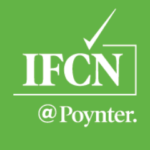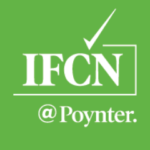What does the IFCN Code of Principles Require?
The International Fact-Checking Network first published its Code of Principles in 2016.
After Facebook made adherence to the IFCN’s code of principles a requirement for partnering in its effort to limit misinformation, the IFCN developed an application and review process for would-be signatories. The application elaborates on the text of the original Code of Principles. In effect, the application adds “fine print” to the IFCN statement of principles. This article shows how, comparing the descriptions in the Code to requirements spelled out in the application.
The Five Core IFCN Principles
1. A commitment to Nonpartisanship and Fairness
Signatory organizations fact-check claims using the same standard for every fact check. They do not concentrate their fact-checking on any one side. They follow the same process for every fact check and let the evidence dictate the conclusions. Signatories do not advocate or take policy positions on the issues they fact-check
2. A commitment to Transparency of Sources
Signatories want their readers to be able to verify findings themselves. Signatories provide all sources in enough detail that readers can replicate their work, except in cases where a source’s personal security could be compromised. In such cases, signatories provide as much detail as possible
3. A commitment to Transparency of Funding & Organization
Signatory organizations are transparent about their funding sources. If they accept funding from other organizations, they ensure that funders have no influence over the conclusions the fact-checkers reach in their reports. Signatory organizations detail the professional background of all key figures in the organization and explain the organizational structure and legal status. Signatories clearly indicate a way for readers to communicate with them.
4. A commitment to Transparency of Methodology
Signatories explain the methodology they use to select, research, write, edit, publish and correct their fact checks. They encourage readers to send claims to fact-check and are transparent on why and how they fact-check.
5. A commitment to an Open & Honest Corrections Policy
Signatories publish their corrections policy and follow it scrupulously. They correct clearly and transparently in line with the corrections policy, seeking so far as possible to ensure that readers see the corrected version.
Note: Originally we tried to nest the application criteria under the matching core principle. The amount of judgment required convinced us to simply present the five principles followed by the six application criteria with their subgroups.
The 12 IFCN Assessment Criteria
Criterion 1a
Proof of registration
Evidence required: Please provide evidence that the signatory is a legally-registered organization set up exclusively for the purpose of fact-checking or the distinct fact-checking project of a recognized media house or research institution.Criterion 1b
Archive
Evidence required: Insert a link to the archive of fact checks published in the previous three months. If you do not collect all fact checks in one place, please explain how the fact-checking is conducted by your organization.Criterion 2a
Body of work sample
Evidence required: Please share links to ten fact checks that better represent the scope and consistency of your fact-checking. Provide a short explanation of how your organization strives to maintain coherent standards across fact checks.Criterion 2b
Nonpartisanship policy
Evidence required: Please share evidence of your policy preventing staff from direct involvement in political parties and advocacy organizations. Please also indicate the policy your organization has as a whole regarding advocacy and supporting political candidates.Criterion 3a
Sources Policy
Please share a brief and public explanation (500 words max) of how sources are provided in enough detail that readers could replicate the fact check. If you have a public policy on how you find and use sources for your fact-checking, it should be shared here.Criterion 4a
Funding Sources
Evidence required: Please link to the section where you publicly list your sources of funding (including, if they exist, any rules around which types of funding you do or don’t accept), or a statement on ownership if you are the branch of an established media organization or research institution.Criterion 4b
Staff
Evidence required: Please link to the section detailing all authors and key actors behind your fact-checking project with their biographies. You can also list the name and bios of the members of the editorial board, pool of experts, advisory board, etc. if your organization has those.Criterion 4c
Contact
Evidence required: Please link to the section where readers can get in touch with the organization.Criterion 5a
Detailed Methodology
Evidence required: Please link to a section or article detailing the steps you follow for your fact-checking work.Criterion 5b
Claim submissions
Evidence required: Please link to the page or process through which readers can submit claims to fact-check. If you do not allow this, please briefly explain why.Criterion 6a
Corrections policy
Evidence required: Please link to the page with your policy to address corrections. If it is not public, please share your organization’s handbook.Criterion 6b
Examples of corrections
Evidence required: Please provide two examples of a correction made, or correction requests handled, in the past year.
The IFCN’s pool of independent assessors, the individuals who review applications, sometimes mention requirements beyond those specified in the 12 criteria. For example, more than one assessor has asked an applicant to add a page to its website showing a record of all corrections.




